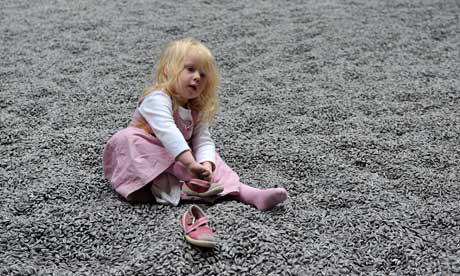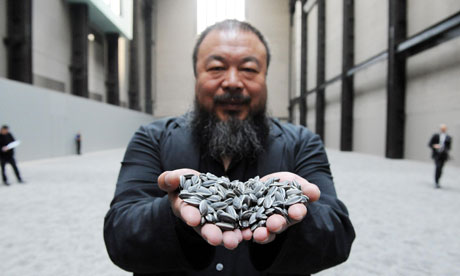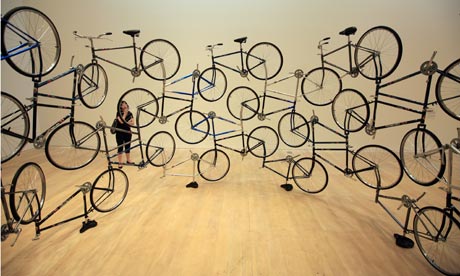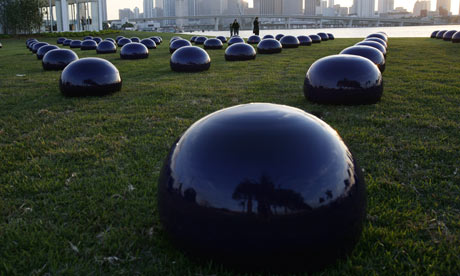 People power comes to the Turbine Hall: Ai Weiwei's Sunflower Seeds
People power comes to the Turbine Hall: Ai Weiwei's Sunflower SeedsIt took an army of 1,600 Chinese artisans to create Ai Weiwei's 100m handpainted porcelain 'seeds', which are scattered over the floor of Tate Modern's Turbine Hall

Day at the beach? A young girl sits down on Ai Weiwei's porcelain sunflower seeds in Tate Modern's Turbine Hall. Photograph: Andy Rain/EPA
The floor is entirely covered with a deep layer of what appear to be grey pebbles. It is like a bleak Suffolk beach, and a toddler, getting into the spirit of it, has shed her shoes and is having a sit-down in her stockinged feet. Adults are not so comfortable: as if caught out by a freak snowstorm in the wrong shoes, several are picking a distinctly wobbly way over the crunchy, uneven surface, suddenly looking out of place in autumnal London clothes.
There is more to Chinese artist Ai Weiwei's installation than meets the eye, however. Bend and pick up one of the "pebbles" and you can see that it resembles a sunflower seed encased in its striped husk. In fact, each one – and there are 100 million of them, covering an area of 1,000 square metres – is handmade from porcelain and has been individually handpainted.
Ai – a bearded, impassive, black-clad figure, who snapped the photographers surrounding him at today's press view almost as busily as they did him, and posted the results on Twitter – had the "seeds" made in the southern Chinese city of Jingdezhen.
"Historically, the town's only activity has been making porcelainware for over 1,000 years. The super-high-quality skill for generations has been making imperial porcelainware," he said. "In modern days, however, it has become very commercialised."
Harnessing traditional craft skills, each seed was moulded, fired, and painted with three or four individual brush strokes, often by women taking the objects home to work on them. One thousand six hundred people were involved in the process. "Even taxi drivers were talking about it," he said.
"I tried to explain to [the artisans] what we wanted them for, but they found it very difficult to understand," said Ai. "Everything they usually make is practical, and the painters are used to creating classically beautiful flowers using a high degree of skill."
He said that the workers had been paid a living wage – in fact slightly more than customary – to work on the project. "Now they are asking when we can start again," he said. "I shall have to think of a new project."
Sunflower seeds, he said, had a particular significance in recent Chinese culture and history. During the cultural revolution, Mao Zedong was often likened to the sun and the people to sunflowers, gazing adoringly at his face. But sunflowers were also a humble but valued source of food in straitened times, a snack to be consumed with friends.
What if the temptation to put one of these lovingly made objects in your pocket becomes too great? Smiling, he said: "They might also want to eat one, and that would be a safety issue for the museum." He added: "If I was in the audience I would definitely want to take a seed. But for the museum, it is a total work, and taking a seed would affect the work. Institutions have their own policies. But I know I would want to take a seed."
A spokeswoman for the museum confirmed that they would be "encouraging people not to" depart with a souvenir. After the installation at Tate Modern is closed the seeds, which weigh 150 tons, will be shipped back to Ai's studio in Beijing, where he will think about using them for another project.
Did he make any of the 100 million sunflower seeds himself? "I made three or four," he said. "But none of them was any good."
Tate Modern's sunflower seeds: the world in the palm of your hand
Courtesy of Chinese artist Ai Weiwei, the Turbine Hall is now carpeted with a million hand-painted seeds – an image of globalisation both politically powerful and hauntingly beautiful.

Quite a handful ... Ai Weiwei with his sunflower seeds in Tate Modern's Turbine Hall. Photograph: Fiona Hanson/PA
Indeed he has so much to say that the 53-year-old is not only China's most famous living artist, but also a constant irritant to its authorities. When Tate Modern announced recently that it had commissioned him to fill its Turbine Hall later this year, it was a welcome reminder of his work, which in recent times has become almost overshadowed by his social and political criticism.
But the voice itself was forged in his earliest childhood. "I experienced humanity before I should. When I was very young," he says. If that sounds grandiloquent, consider his history: Ai spent years of his childhood in a labour camp in the far north-west of China, on the edge of the Gobi desert. His father, Ai Qing, was an artist and one of China's most revered modern poets, but fell foul of the late 1950s anti-rightist campaign. Life was precarious, and his parents had little time to spare for their offspring. "It was like being a little boy in the centre of a storm. Just always scared or surprised by surroundings that you cannot make sense of. And you have no comparisons because you have no memory of what another life can be," he says.

But 12 years later, when his father fell ill, he moved back to Beijing. He did so with little to show for his time in the US, at least to the outside eye. "I hadn't become very rich or got status or become part of the American dream – I had no success. I hadn't got my school diploma [or] American citizenship – that's unique for the early Chinese students in the US; those are two things they all got. I was unmarried, didn't have a real job, couldn't drive. So my mother really thought I'd never been there. She was shy to even introduce me to her friends," he says jokingly.
Ai's father sensed his discomfort on returning and offered some advice: don't be courteous. Treat this country as your home. Do whatever you want. The artist is still grateful for those words, though one feels the Chinese government may be less so. Ai helped to design the "Bird's Nest" national stadium for the 2008 Olympics – then blasted the country's "disgusting" political conditions and the use of the games as propaganda. Since then he has championed a number of sensitive causes, notably internet freedom and justice for children who died when shoddy schools collapsed in the devastating Sichuan earthquake. Others have fallen foul of the government for far less, and supporters fear Ai's position and his father's reputation will only shield him for so long. Certainly, the authorities seem to regard him, increasingly, as a problem. His China-based blog has been closed down, his email account hacked into, and security officials have made inquiries at his bank. In Chengdu last year, police detained him and fellow activists to prevent them attending the trial of a campaigner investigating schoolchildren's deaths. In the furore, a policeman punched him in the head, leaving him with painful headaches; weeks later, while working in Germany, he underwent surgery after doctors spotted internal bleeding.
"Life is never guaranteed to be safe so we better use it when we are still in good condition," he says now. "I always think that incident shouldn't have happened that way. Other than that . . . I don't want the bad memories, bad incidents, to stop me or have an effect on me."
"The state is taking action against people who have peacefully demonstrated their ideas. They are writers – all they did is to express their minds through the internet. So the pattern is very clear. The state tries to maintain stability by crushing any thought of making change," Ai says. "It could happen to me, because I did the same thing and in many cases I went much further and deeper. But I always think the government can learn from their mistakes – they should learn and should understand; they should be just as intelligent as anyone else. I have to be wishful [optimistic] in that sense."
His father's experiences have left him, he says, with a sense of duty "to speak for the generation, or generations, who didn't have a chance to speak out". "And I also have to speak out for people around me who are afraid, who think it is not worth it or who have totally given up hope. So I want to set an example: you can do it and this is OK, to speak out," he says.
And then, of course, there's his art. Ai's growing profile as a government critic has come swift on the heels of artistic acclaim for works such as his photographic series "Dropping a Han dynasty urn", which captures his destruction of an ancient vessel. But to Ai there is no meaningful distinction between his art and the rest of his life: "I'm not worried viewers will be distracted [by my activism] – I am worried they will not," he says. "I would never say I am just an artist or have some higher aesthetic values."
In recent years even his work for galleries has become overtly political, blurring the boundary between art and activism – at a recent show in Munich, his Remembering installation comprised 9,000 children's backpacks, in reference to the death toll of pupils in the 2008 Sichuan earthquake. Attached to the outside of the Haus der Kunst, they spelled out a grieving mother's words: "She lived happily for seven years in this world."
But he says his relationship with the country has been strengthened by his struggles with it. He makes a noise somewhere between a laugh and a sigh when asked if he fears the authorities might bar him from returning to China one day. "People have said, if you leave, you may never come back. Or they may not even let you leave. So this is always a cost you may have to pay," he says. "But I don't want to restrict myself: when it happens, it happens. I have to deal with it, but not to prepare for it, because it is a kind of stupidity. If you prepare for it too much, you become a part of it."

Following his recent October opening at the Tate Modern, on November 5, 2010, Ai WeiWei, Chinese artist and activist, was placed under house arrest by the Chinese police. Weiwei said this house arrest was planned to prevent him from attending a party to mark the demolition of his newly built Shanghai studio, an order from the Chinese government. We learned on Artdaily, that just as he was finishing construction on his new studio, he received a notice from the government informing him that he would have to knock it down. In good activist fashion, Weiwei planned a party to commemorate and draw attention to this event.
Video link: http://www.guardian.co.uk/artanddesign/video/2010/mar/18/ai-weiwei-turbine-hall-tate



No comments:
Post a Comment